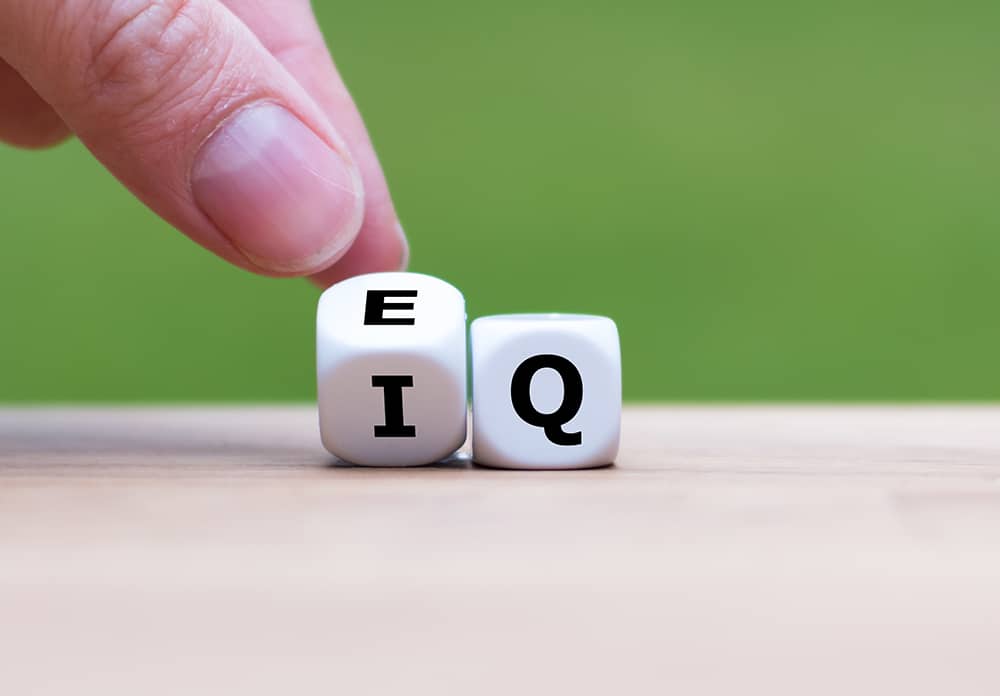
GMD is delighted to be working with Dr Mark Pegg from Ashridge Executive Education, on a number of learning initiatives around Emotional Intelligence, Wellbeing and Mental Health awareness within the workplace, here are his thoughts around IQ vs, EQ.
One of the joys of working in learning and development and business at the same time is the wonderful opportunity it gives to gather stories from participants and my own life and use them to illustrate how theory applies in practice: that attention to academic research, models, tools and techniques can genuinely help managers add more value and build business success.
Let’s first define our terms. Intelligence Quotient or IQ represents abilities such as visual and spatial processing, knowledge, reasoning and memory. Emotional Intelligence or EQ is centred on abilities such as identifying and controlling emotions, perceiving and evaluating how others feel, in communicating and relating to others.
In my early years as a manager, I learned on the job and using IQ seemed obvious: the path to success was: Be cleverer, work harder, solve more difficult problems and offer a more attractive product – cheaper, faster, better. This philosophy seemed total common sense, get on in life by being more dedicated and determined than the competition. I worked in heavy industry where people called a spade a bl***y shovel and showing your emotional side was seen as a weakness unless it was a motivational chat, passion for the job or gallows humour.
Then along came Daniel Goleman and his book Emotional intelligence. It is not that EQ did not already exist before, of course, it did, and in many businesses, it really matters more than IQ. What Goleman did for me was give EQ an accessible language, a model, a set of tools we can use – to be more self-aware of how EQ can complement IQ skills. I had by then moved from industry to consultancy, and it was obvious you had to have EQ with customers if you were going to win any work. Sure, they looked at the IQ, the technical proposal and the price, but they were also buying EQ, faith in your persuasive skills to help them take on their challenges and add value. You had to go beyond what we called the ‘thud factor.’ An impressively weighty document that ‘thudded’ as it hit their desk was all very well. Still, it was no use if you could not help your client persuade their staff, gain their commitment and involvement to deliver the recommendations. Working with their people to convince them intellectually AND emotionally, that they could change and get things done.
Goleman opened my eyes and gave me more focus. His thinking was a game-changer, helping me step up to the next level. I had added leadership teaching to my consultancy and continued to collect stories that helped illustrate the importance of IQ AND EQ. Let me share two of my recent stories, one where the absence of EQ is holding back an organisation and another where it is helping it become more successful.
I was in an executive committee held just after one of our members had been dismissed by the Chair. They’d had disagreements for some time, so it was not a surprise, but she was a popular colleague. Unfortunately, the Chair decided to breeze through the business agenda without mentioning the ‘elephant in the room’. I sat between two colleagues, and I could feel them bristling, shifting in their seats; their body language was deeply uncomfortable. Finally, one burst out to ask how could we continue without mentioning our former colleague? She wanted an explanation; she wanted us to express our thanks to her before we moved on. The other colleague joined in, and she decided there and then that this was the last straw and resigned immediately after the meeting. The Chair now had not one but two critical roles to fill – if only she had attended to EQ AND IQ. She lost two vital colleagues, which has impacted adversely on business performance.
In another business, a vital deadline had arrived, and the senior team were panicking. Stress levels were rising because an innovative leadership programme we had invested heavily in was due to run for the first time, but bookings were low. The Finance Director wanted it cancelled before we incurred more cost. IQ told us he was right, but the group took a deep breath together and shared how important this was for us emotionally. The psychological blow of losing this programme would be huge: it was a major bet on the future direction of our business. We decided to keep our nerve, to defer a decision for another week. It was the half-term holiday, and perhaps people caught up on their emails: the bookings came flooding in, the programme ran, and today it’s the most successful, most prestigious and most profitable programme – victory for using IQ AND EQ in decision making.
Dr Mark Pegg MA (Oxon) D.Phil CCMI FCIPD




